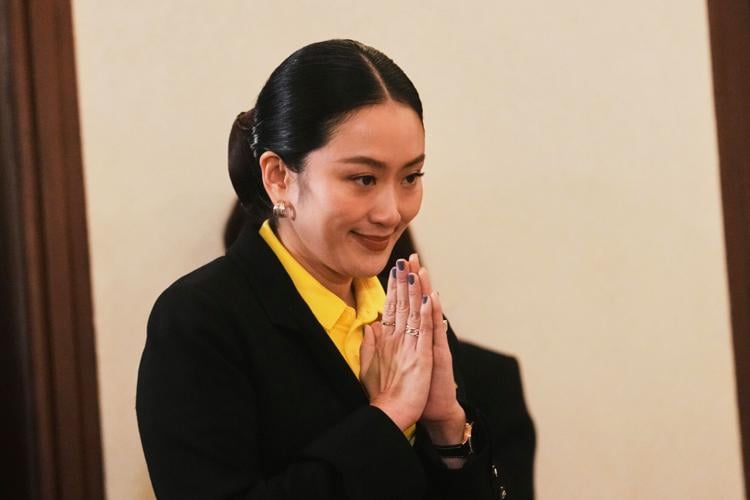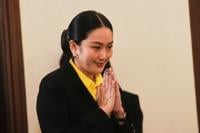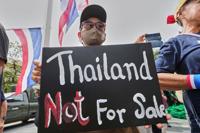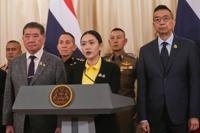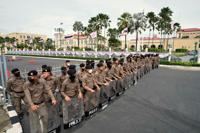BANGKOK (AP) — Thailand’s Prime Minister Paetongtarn Shinawatra apologized Thursday for the deepening political turbulence set off by a leaked recording of her negotiations with Cambodia's former leader in the two nations' latest border dispute.
Calls for her resignation grew after a major coalition partner pulled out and further destabilized the already rocky government led by her Pheu Thai Party. Paetongtarn has already been criticized for a perceived soft stance toward Cambodia, especially by right-wing nationalists who are longtime foes of her father, former Prime Minister Thaksin Shinawatra.
The latest border dispute involved an armed confrontation May 28 in a relatively small “no man’s land” both countries claim in which one Cambodian soldier was killed.
Cambodia’s Senate President Hun Sen posted the full, 17-minute phone call on his Facebook page after a shorter version was leaked Wednesday. He said he recorded the conversation “to avoid any misunderstanding or misrepresentation in official matters,” adding that he shared the recording with at least 80 people.
In the recording, Paetongtarn was heard calling Hun Sen “uncle” as they discussed through translators whether they should lift border restrictions imposed after the deadly clash. Backlash revolved around her calling a Thai army commander in charge of the border area where the clash happened as “an opponent.” Critics said she was trying to please Hun Sen too much and made Thailand look weak.
Paetongtarn said her comments were a negotiation tactic and that her goal was to bring peace between the countries.
However, she said she would no longer engage in a private talk with Hun Sen as she could not trust him. “It’s now clear that all that he cares about is his popularity in the country, without considering impacts on relations with other countries,” she said.
Thailand's Foreign Affairs Ministry said it submitted a protest letter over the leaked recording with the Cambodian ambassador, saying that Cambodia’s actions were unacceptable and “contradicted internationally accepted practices and the spirit of good neighborliness. ”
Paetongtarn has described the two families as having close, longtime relationships. Her father Thaksin and Hun Sen reportedly regard each other as “godbrothers.” In 2009, Hun Sen appointed Thaksin as a Cambodian government adviser, but Thaksin soon resigned the position.
Hours after the leak, the Bhumjaithai party, the biggest partner in Paetongtarn’s ruling coalition, said it would leave the coalition because of the leaked phone call. The party's statement said the recording “posed an impact on Thailand’s sovereignty, territory, interests and the army.” The party called for Paetongtarn to take responsibility for the damage, although they did not say how.
There has already been a rift between Bhumjaithai and Pheu Thai over reports that the former would be shuffled out of the powerful Interior Ministry. Several Bhumjaithai leaders are also under investigation over the alleged rigging of the Senate election in which many figures who are reportedly close to the party claimed a majority of seats.
The departure of Bhumjaithai left the 10-party coalition with 255 seats, just above the majority of the 500-seat house.
Opposition leader Natthaphong Ruengpanyawut of the People’s Party on Thursday called for Paetongtarn to dissolve Parliament and hold a new election. He said the leaked phone call was “the last straw” that destroyed people's faith in her administration.
Dozens of nationalists protesters gathered near the Government House on Thursday, holding Thai national flags and signs calling for Paetongtarn to resign. Some senators said they will file a motion to impeach her, and several other individuals also filed complaints over the matter to law enforcement agencies.
People have also expressed concern that Paetongtarn’s comment towards the local army commander could potentially lead to a military coup. Her father Thaksin, was ousted in a coup in 2006, and Thaksin’s sister, Yingluck Shinawatra, became prime minister in 2011 and was ousted by a military coup in 2014.
The army said in a statement Thursday that it would like the people to “maintain confidence in the Royal Thai Army’s steadfast commitment to constitutional monarchy and its readiness to execute its constitutional mandate of protecting national sovereignty through established legal frameworks and institutional mechanisms."

